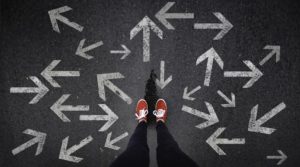“Unprecedented”
“Trying”
“Uncertain”
“Challenging”
“Difficult”

As we adjust to a “new normal”, all of the above words have been used repeatedly in advertisements, by newscasters, politicians and neighbors to describe significant shifts in our lives due to the pandemic, significant political shifts, social upheaval and even how we discuss these issues. One of the most contentious issues becomes “What can we know for sure?” The answer? Nothing.
This is definitely not an answer people are happy to hear. However in the treatment of both Obsessive Compulsive Disorder and Generalized Anxiety Disorder, one of the most common statements I hear is “I’m not doing that unless I know for sure it’s safe.” While all of us would like to live in a world with all things being absolutely known, but with most things we just have varying likelihoods of the outcome we would like:
- Should I not go on the job interview because I don’t know for sure I’ll get the job?
- I need to avoid all dogs because one could bite me.
- Should I avoid doorknobs at home because I don’t know for sure I won’t get HIV/AIDS?
- Should I not go on a date because I don’t know for sure if I’ll marry him or her?
A better way to think through each of these would include a statistical analysis of the likelihood of each event, and/or the outcome of each event:
- I’ve been granted for the interview, which means that I’m likely to have the qualifications of the job and may be chosen (why would they ask for an interview for an unqualified applicant?), but even if I’m not hired, nothing bad really happens. If anything, I get practice interviewing.
- While some dogs may be aggressive, the vast majority are not (why don’t owners worry about being killed on a daily basis?), and even if a dog bites me, I’m unlikely to have any long term affects (dogs aren’t venomous).
- What’s the real likelihood of getting a sexually transmitted disease from a doorknob?
- How will I know if I can marry that person without dating him or her? And if a blind date goes poorly, is it catastrophic?
Everything we do has some level of risk. Very often we don’t think about the associated risk of activities (driving, going for a walk) that we think we have control over (“At least when I’m driving, I’m in control of my car, not like when I’m flying”), even if we have less control than we think (Can I control the car next to me? What if other drivers are texting or are drunk?).
When we allow our emotions to significantly influence our decisions, especially when data indicates otherwise, we can make our lives more difficult than they need to be:
- What are the benefits of going to the job interview, despite how nervous I am?
- What is most likely to happen if I’m around a dog, other than feeling panicky?
- If everyone else is touching the doorknob at home, is everyone else being reckless with their health, or am I just scared?
- I’m nervous about going on a date, but what if it goes well and we have a great time, and worse case, I have a miserable time and it’s over in an hour or two.
Interestingly, most those with anxiety disorders only see the low likelihood, catastrophic negative outcomes rather than low likelihood, great positive outcomes, let alone the most likely outcomes. With time, cognitive behavioral therapy can teach people how to think differently, and learn to act despite negative emotions, not because of them.
